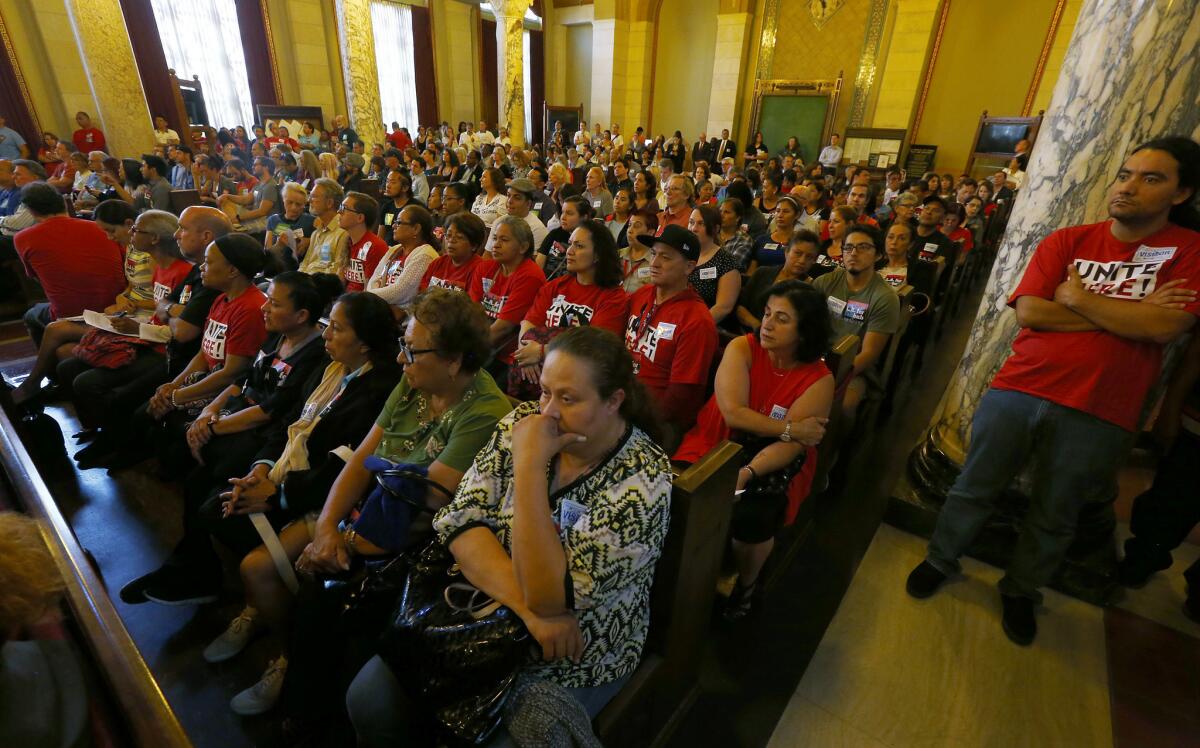L.A. takes step toward new rules on short-term rentals

Los Angeles is one step closer to imposing new rules on Airbnb and other websites that advertise rooms — or whole homes — for short stays, including limiting the number of days places may be offered and penalizing platforms that fail to provide key information to the city.
The Planning Commission voted 5 to 4 on Thursday to back the proposal, which would legalize and regulate the popular but largely unsanctioned practice.
Some rental hosts argued that the regulations would trample on privacy rights and hurt homeowners financially. If the law passes, “I might lose my house, or I’ll be forced to sell it,” said Al Antonini, a 77-year-old Highland Park resident who said he covers his mortgage and other expenses by renting out a back unit and studio on Airbnb.
And neighborhood activists and housing advocates who have pushed for stricter regulation were disappointed when the commission opted to increase the proposed cap on how often short-term rentals were allowed to 180 days annually.
Letting people rent out spaces for nearly half the year “essentially legalizes hotels in residential neighborhoods,” said Judith Goldman, one of the co-founders of Keep Neighborhoods First, a group concerned about commercial rentals. “This will dramatically weaken the ordinance and provide little, if no, relief to residents all over the city,” she said.
The plan still must be approved by the City Council. If L.A. presses forward with the rules, it will join other cities across the country that are trying to regulate the booming business of short-term rentals.
Websites such as Airbnb, HomeAway and the hosts who use them tout the rentals as an economic lifeline, injecting cash into neighborhoods and helping people share both their homes and a slice of their lives.
But housing activists, neighborhood groups, hotels and their workers argue that the proliferation of “commercialized” rentals has pulled needed housing off the market, put regulated hotels at a disadvantage and worsened noise and other nuisances.
As it stands, renting out a home or room for less than 30 days at a time is illegal in most of the city, according to planning officials. Lawmakers say they want to allow residents to share their homes from time to time but prevent whole buildings from becoming “de facto hotels.”
Under the proposed rules, Angelenos who rent out their primary residence for short stays could do so for up to 180 days annually. The Planning Commission also voted to allow people to rent out other kinds of property for short stays — such as a second home — for a maximum of 15 days a year.
Hosts would have to collect the same kind of lodging taxes as hotels and register with the city. If they failed to register, they could be fined at least $500 a day. And renting out a room, apartment or house for more days than the city allows could mean a fine of at least $2,000 a day.
The Planning Commission also asked city lawyers to draft a “three strikes” rule to suspend rental hosts who repeatedly violated the rules.
Airbnb and similar platforms could be fined $1,000 a day for refusing to turn over the addresses of rentals that had not registered with the city. The websites also would be required to regularly provide host names and addresses and detail how long guests had stayed and what they had paid.
The Los Angeles Short Term Rental Alliance, which includes hosts who use Airbnb, HomeAway and other platforms, argued that the plan was a “job killer” that would devastate Angelenos who rely on the income from such rentals.
“It will cause a tremendous amount of hardship,” said Robert St.Genis, executive director of the alliance. “And I don’t think it’ll have any impact on the housing market — other than some people may be forced to sell their homes because they can no longer stay in them.”
John Choi, the Southern California policy manager for Airbnb, said requiring companies to turn over “bulk confidential data” would jeopardize consumer privacy. Tech industry groups also have argued that forcing websites to police their listings flouts federal law.
Housing and neighborhood activists counter that if Los Angeles wants to be able to halt illegal rentals, Airbnb and similar websites need to help. “No one is asking for private information here,” said Amanda Seward, who is active with Keep Neighborhoods First.
The proposed law states that information turned over by the websites and hosts about guest stays would not be publicly available, planning officials said. That would not apply, however, to the applications that rental hosts would fill out to register.
Follow me on Twitter at @LATimesEmily
ALSO
Los Angeles may pass new ban on homeless people living in cars
Metro puts half-cent sales tax increase for transportation projects on November ballot
AEG drops hotel project amid dispute at L.A. City Hall over convention center plans
More to Read
Start your day right
Sign up for Essential California for news, features and recommendations from the L.A. Times and beyond in your inbox six days a week.
You may occasionally receive promotional content from the Los Angeles Times.







